- Slug: BC-CNS-Boater Education,1160
- Note: A Cronkite News Service Special Report
- Multimedia: Flash video for computers; YouTube video for mobile devices.
- Photos available (thumbnails, captions below)
- With: BC-CNS-Boater Education-Box
By TRAVIS GRABOW
Cronkite News Service
PARKER _ La Paz County Sheriff’s Lt. Alan Nelson guides his patrol boat across the choppy waters of the Colorado River, keeping a careful watch for those breaking the law or endangering themselves and others.
He approaches a small boat towing a tube and cuts back on the throttle, addressing the seven people aboard.
“How old are the kids?” he shouts.
Eleven, 9 and 7, they respond.
“OK, they need to have a life jacket on whenever they are out in the boat,” Nelson says. “So if you get those on ’em, I’ll be on my way.”
After patrolling Arizona waterways for more than 30 years, 20 of them on this stretch of the river, Nelson has handled plenty of routine situations like this one in which boaters simply aren’t aware of the rules. To his dismay, Nelson also has dealt with plenty of situations in which that lack of knowledge has contributed to accidents.
Over the Thanksgiving holiday weekend, for example, a 15-year-old girl on a personal watercraft, traveling about 20 mph, tried to avoid running into her father and sister by letting up on the throttle and turning.
The girl didn’t know that watercraft need thrust to turn, and she ran right up the back of her father’s watercraft, sending her sister to the hospital with injuries that proved not to be serious.
Arizona ranked seventh nationally in its number of boating accidents in 2008, according to U.S. Coast Guard data, and many of those were attributed to lack of boating knowledge.
“It’s been consistent over the last 30 years that I’ve been doing this that between 80-90 percent of boaters involved in accidents have never had any type of formal boating education,” Nelson said. “Most people said they learned from their dad or from their friends but have no clue what the proper rules of the road are.”
That lack of knowledge shows: operator inexperience has been the most common cause of boating accidents in Arizona four of the past five years, according to records kept by the Arizona Game and Fish Department.
Arizona is one of only six states that don’t require some or all of those who operate watercraft to complete a boating-education course. All others at least require children or teens to take an education course, and seven states and the District of Columbia require education for every boater.
Across the Colorado River, California requires education for those convicted of a moving violation. Up the river, Nevada requires education for all boaters born after 1983.
Arizona would follow California’s lead if one state lawmaker has her way. Sen. Linda Gray, R-Phoenix, working with Game and Fish and the Arizona State Parks Department, said she plans to introduce a bill that would require those who receive tickets while on the water to complete a boating-education course.
Gray, who in 2008 pushed for tougher laws against drunken boating, said boating education for offenders would make Arizona safer because the hassle of taking the class would deter those who might otherwise be more likely to break the law.
“If we’re just going after the offenders, I think the legislative body will be in support,” she said.
It wouldn’t be practical to require the course for all boaters, Gray said. “Who’s going to pay for it?” she said.
A previous attempt to require boating education in Arizona didn’t get very far. A 2001 bill that would have required a license for personal watercraft users born after 1991 didn’t make it out of the Senate.
Ed Huntsman, boating education program manager for Game and Fish, said he personally thinks it’s the responsibility of individual boaters to educate themselves, especially given the number of accidents in Arizona.
“The good news is that while statistically we’re a pretty dangerous place to boat, we have pretty low serious injury and fatality numbers,” he said. “The bad news is the number of accidents, we’re consistently in the top 10 nationally.”
According to Game and Fish, there were 197 boating accidents involving 250 operators in Arizona in 2008. Those resulted in 124 injuries, six fatalities and an estimated $533,000 in damage.
“If you check the Colorado River system in its entirety,” Huntsman said, “it’s the single most dangerous strip of water in the United States.”
The National Transportation Safety Board has been pushing states for years to adopt more comprehensive boating safety laws _ it’s been on the agency’s national Most Wanted Improvements list since 1994.
The goal is increasing essential knowledge among the boating population, said Bill Gossard, director of the NTSB’s Office of Safety Recommendations and Advocacy.
“It’s like being on the highway. You expect people to know what they’re doing,” he said in a telephone interview from Washington, D.C. “You go out boating, and not everybody knows what they’re doing, and they’re a danger to you and your family.”
Research by the U.S. Coast Guard suggests that boating education programs reduce fatal accidents. According to a 2006 study, states that require education for all boaters when adopting the requirement see a larger drop in fatalities than states that require education only for certain groups.
In Nevada, where only boaters born after 1983 have to take boating-education courses, officials decided that phasing in the requirement would be easiest to implement, said Ed Lyngar, boating education coordinator for the Nevada Department of Wildlife.
“We want to make this easy on people,” he said. “We don’t want to be intrusive, we don’t want to cost them more money. We want to be as unobtrusive as possible and just generate that minimal amount of knowledge that boaters should have.”
Mike Maynard, a Nevada enforcement officer on Lake Mead, said his state’s law makes sense.
“We have a population of boaters that’s much larger than it was several years ago obviously, with equipment that didn’t exist 40 years ago, and you’re giving all this high-powered equipment and not requiring any training,” he said. “So I think that mandatory education will save lives.”
Nelson, with the La Paz County Sheriff’s Office, said a proposal to require boating education likely would be a tough sell for the state Legislature.
“Arizona has been traditionally a state where our legislature has tried to reduce the burdens on the public,” Nelson said. “It’s been my experience that we tend to look for less government and less rules and regulations, and I think that would be the biggest hurdle in actually trying to do it.”
In the end, he said, it comes down to what effect mandatory education would have.
“In every state it has been instituted in, the accident rate has gone down for the people required to take the course,” Nelson said. “So it’s proven that it works, and we’d really like to see our legislature make boating education mandatory.”
^___=
Web Links:
_ Arizona Game and Fish Department: www.azgfd.gov
_ Nevada Department of Wildlife: www.ndow.org
_ U.S. Coast Guard’s Boating Safety Resource Center: www.uscgboating.org
_ National Transportation Safety Board: www.ntsb.gov
^___=
PHOTOS: Click thumbnails to see full-resolution images.
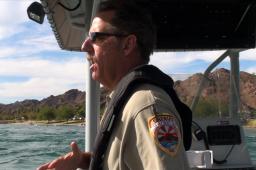
Lt. Alan Nelson of the La Paz County Sheriff’s Office shouts instructions to boaters on the Colorado River near Parker. Nelson says requiring a boating-education course could reduce accidents. Arizona ranked seventh in the nation in its number of boating accidents in 2008, yet it’s one of only six states that doesn’t require some or all operators to go through a course on safe boating. (Cronkite News Service Photo by Travis Grabow)
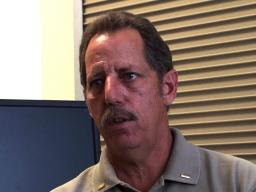
La Paz County Sheriff’s Lt. Alan Nelson, who patrols the Colorado River near Parker, says requiring a boating-education course could reduce accidents. Arizona ranked seventh in the nation in its number of boating accidents in 2008, yet it’s one of only six states that doesn’t require some or all operators to go through a course on safe boating. (Cronkite News Service Photo by Travis Grabow)
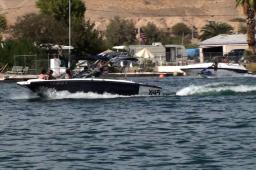
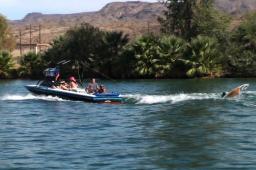
Boats travel along the the Colorado River near Parker. Arizona ranked seventh in the nation in its number of boating accidents in 2008, yet it’s one of only six states that doesn’t require some or all operators to go through a course on safe boating. (Cronkite News Service Photos by Travis Grabow)
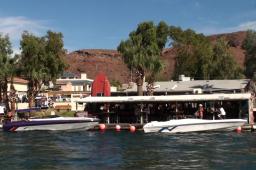
Boats tie up next to a bar along the Colorado River near Parker. Arizona ranked seventh in the nation in its number of boating accidents in 2008, yet it’s one of only six states that doesn’t require some or all operators to go through a course on safe boating. (Cronkite News Service Photo by Travis Grabow)